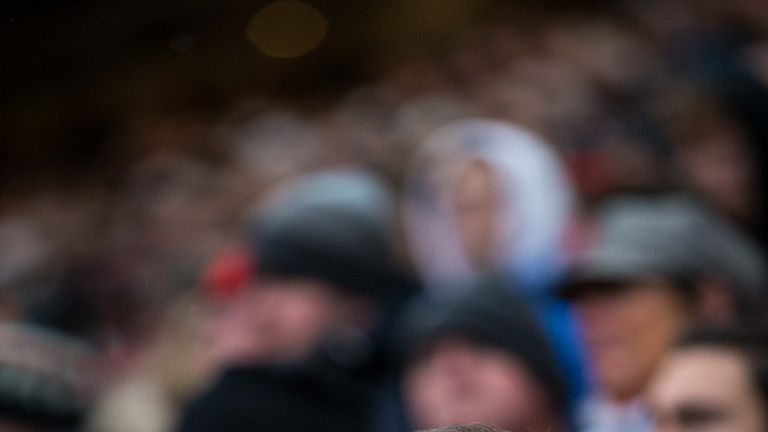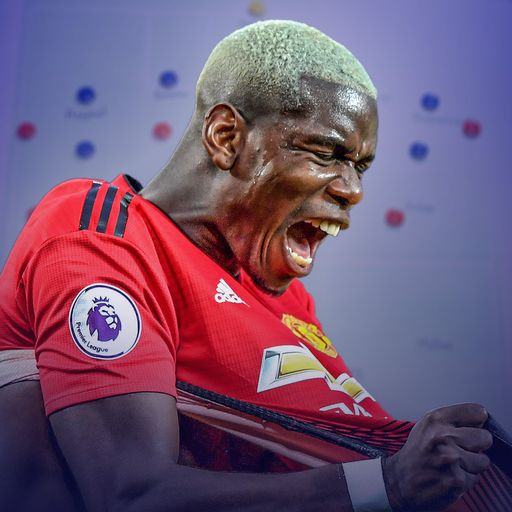Manchester United want a sporting director but will they get it right?
Watch Huddersfield vs Man Utd live on Sky Sports Premier League from 1.00pm on Sunday; Kick-off at 2.00pm

Thursday 2 May 2019 16:05, UK
Manchester United are seeking a sporting director but what’s involved and why is it so important? Adam Bate spoke to those in the know to find out the details behind the role, the skills required, and the huge irony at the heart of the problem at Old Trafford…
Who is the greatest sporting director in the history of English football? It is a question worth asking if you are the country's most successful football club and are now looking to appoint one for the first time. But the answer that is so often given to that question by those who know the role best might be surprising.
It's Sir Alex Ferguson.
"He operated as a sporting director with head coaches and heads of sport science all doing their work underneath him," explains Dr Dan Parnell, of the Centre for Sport Business at the University of Liverpool. "He would set the boundaries of expectations in terms of how people work and how it should be run but then he would let experts get on with their job."
Ferguson provided continuity of structure but never allowed life on the training ground to become staid. His coaching staff was regularly freshened up so that players heard different voices and were exposed to new ideas - something he was able to embrace at an age when more hands-on managers were undermined by the limitations of their own knowledge.
Most now accept that Ferguson's departure, along with that of chief executive David Gill in the summer of 2013, left a vacuum that was inadequately filled. New managers came and went. Ed Woodward brought commercial acumen, but other gaps were left unfilled.
The problems were inevitable. Manchester United had the greatest sporting director there has ever been. It wasn't that they didn't replace him well. They didn't replace him at all.
What is a sporting director?
Asking what a sporting director actually does might seem like a simple question but it's not a silly one. The role can be titled differently - head of football operations, director of football - and it can be interpreted very differently too, depending on the fit for the organisation.
"Some sporting directors have responsibility for recruitment at a club," says Parnell. "Some just identify players and put them on the table for a conversation with the first-team manager and the board. Some just focus on talent development and don't really have an influence on recruitment. Every club has the right to do whatever they want."
However, recruitment is often seen as the key aspect of the job and, while there has been resistance to the idea of the sporting director being given this power over the head coach, it does makes sense. With the future of the coach so inextricably tied to the next result, it is only natural that they will always want to sign another player and another player.
A sporting director can make an informed call on whether that is the right move for the club. This appears to have been a source of tension between Woodward and Jose Mourinho when targeting a defender last summer. Perhaps having a sporting director between the two, one who could have better understood the reasoning of the other, would have helped.
Indeed, one of the most useful aspects of the sporting director role is that it can function as an intermediary between the head coach and the club's board.
Bradford manager Gary Bowyer knows a thing or two about challenging owners, having previously worked for Venky's at Blackburn and the Oyston family at Blackpool. That played its part in encouraging him to complete a degree in sport directorship.
"To have somebody who acts between the manager and the board or the owners is a godsend," Bowyer told Sky Sports. "It allows the manager to concentrate on what he's best at - working on the grass and dealing with the players. The way that the game is now, for the old-fashioned manager who manages the football club, the job is a lot bigger now.
"There's many a time that you look for someone to work as a buffer between the manager and the owners. You are talking about a whole vision. A strategy for the football club. The values of the football club. That is a lot for the manager to take on board as well as his job."
Mourinho has spoken a lot about 'the conditions' at United and, while few had much sympathy when he was sacked in December with the club closer to the relegation zone than the top of the Premier League, it is understandable that he would not want to devote valuable time to other areas when he knew he would be judged only on results.
For him, the subject of recruitment was clearly a fraught one. Would the arrival of a sporting director take some of the heat away from Woodward? That is the hope.
What do Manchester United want?
Again, the question of what Manchester United want from a sporting director should be simple but it is not. "It would be hard for anyone to work out what they want because they have not been explicit in communicating exactly what they are looking for," says Parnell, a board member with the Association of Sporting Directors.
"I have got concerns about Manchester United. If anyone else was the custodian of that club, they would have put people around them by now to help them make better decisions on the football side of the business but that hasn't happened. Part of me feels, and we see this with a lot of chief executives, really they would like to be sporting directors themselves.
"Do they focus on the finances, which is often their area of expertise, or do they get the chance to be in the limelight and be associated with the manager and player recruitment? Most chief executives would want nothing to do with any of that and keep their name out of the firing line, but others crave it and want to be part of that sporting director remit."
Mike Phelan and Rio Ferdinand have both been linked to the role of sporting director at United. Both are former players and popular figures at the club, with Phelan currently working as an assistant to head coach Ole Gunnar Solskjaer. But how much power they would really have if they were brought in as a sporting director is unclear.
Parnell adds: "The question I would ask of United if Mike or Rio come in is what's going to be their actual roles? Who is going to do what? Will they be genuine roles? Will they be the real decision-makers or will they just be people who the chief executive is close to? He might be thinking that they are good people and he'll still be able to get his decision across."
Of course, perhaps the even bigger question were Phelan or Ferdinand empowered in that sporting director role, is whether or not they have the skill-set required to succeed in it.
That's not obvious either, given their career history.
Phelan was appointed as the sporting director at Central Coast Mariners in Australia last summer but had barely started in the role when he returned to United.
As for Ferdinand, he has no direct experience in the role at all but can point to certain transferable skills. As the head of a major talent agency, he has knowledge of the business world, a track record of doing deals, managing people and good communication skills.
"For some, it would be easy to write these people like Mike and Rio off but they have a tremendous wealth of experience," says Parnell. "It may be that they have the trust of the chief executive and that is important. He could view them as perfect people to work with."
Even so, this is Manchester United. This is not only one of the top jobs in the industry but one of the most difficult too, given the urgent need to manage change in the organisation.
"It would still be incredible for someone to go into one of those roles so quickly," adds Parnell. "That's not to say they couldn't do it. But if you were looking for experts in the role they would fall short on many criteria. One of the criteria of being an expert is having success in that position and neither of them necessarily have that experience."
So who are the experts in the field?
There are those out there who do have experience of doing the job and doing it well.
Manchester United could look to the work of Stuart Webber. He was instrumental in helping Huddersfield reach the Premier League before achieving the same feat at Norwich. He has demonstrated that he can manage change at two very different organisations.
Kevin Thelwell at Wolves has shown that he can manage relationships, while Jon Rudkin at Leicester is another, like Thelwell, who has made the step up from academy manager.
Interestingly, United's own academy operations manager Nick Cox is a qualified sporting director, having done a degree in the subject at Manchester Metropolitan University. Former Manchester United academy graduate Michael Appleton, currently at West Brom, is another to have completed that degree and he has experience as a head coach too.
How do you become a sporting director?
Of course, there is no substitute for experience but qualifications such as the one at Manchester Met can be an important step and there are now more than 100 people who have studied for a degree in sport directorship. It is one of two universities in England offering the course. The other is Salford, so both are on United's doorstep.
There are a wide variety of individuals who have taken the course. Some are from other sports such as Ashley Giles, the ECB's director of cricket, and Phil Winstanley, the rugby director at Premiership Rugby. Others such as Cox, Appleton and Bowyer, come from all over the football industry.
"Some come from a financial background," says Parnell. "Some have a recruitment background and experience of doing deals. Some are agents who have good networks and can get players in and out of clubs. Some have a legal background and some have a talent development background and have that understanding of what happens on the grass."
Former Derby County defender Michael Johnson is now the head coach of Guyana and recently guided the country to the Gold Cup for the first time in their history. He found the experience valuable. "It taught me a different side to the game," he told Sky Sports.
Alex Rodman, the Bristol Rovers winger, is one current player who has taken the two-year course and credits it with increasing his understanding of the business side of the game.
"We have had a lot of leaders in different fields coming in and giving talks," Rodman told Sky Sports. "We have had the former chief executive at Liverpool, guys from huge marketing companies. All the different aspects. What makes big companies successful? It is fascinating to listen to that and learn what makes great leaders tick and the networking is fantastic.
"The way that German clubs run as a business is so efficient that I would be surprised if every English club in the top two tiers does not have a sporting director over the next five years. The interesting thing is learning that clubs at the top have inefficiencies too. You can't believe that clubs at that level would get that wrong or make this mistake, but they do."
Phil Korklin, co-owner and director of the Momentum sports management football agency, is another who has embarked upon the course. He told Sky Sports: "It's about leadership and how you deal with employees within the structure. It's about being creative and innovative, different business models.
"The module on governance is interesting, learning about best and worst practice and how a football club set up their hierarchy from board level downwards in order to best support their management team."
What characteristics do you need?
Whatever the background, the qualities required in a sporting director are so wide-ranging that it is easy to see why studying for the job as well as doing it would be useful.
"The key part of the role is communication," says Parnell. "There are sporting directors in the Premier League whose job is arguably to manage that relationship between the first-team manager and the chief executive. They need to ensure the first-team manager doesn't leave and the chief executive doesn't sack them. It's the key relationship in the club.
"But you also need to be able to develop strategy. At Manchester United, you would want a strategy to manage that transition from academy to first team.
"The sporting director would be someone who can manage change. For me, that's one of the key aspects of the job. It would be a leader and someone who could look at strategy. What is strategy? How do you develop it? How do you relate it to football?
"It would be someone who knows when to innovate and when not to. In football, there are a lot of ideas, a lot of fads that come and go very quickly, so the challenge is to be at the forefront of change and innovation but to be able to evaluate what actually works.
"It would be someone with an understanding of governance and ownership. That covers everything from agents, doing deals and negotiation, to social media and all kinds of issues.
"If you speak to most academics, they will tell you that you don't necessarily need to know football, what you need is financial acumen. However, I have a different view. You need that financial acumen, no doubt, but you also need to understand how football works."
As for the business of recruitment, even that doesn't just amount to recruiting players or even recruiting the head coach. There is so much more to it than that.
"Everyone always talks about recruitment but it's not just about playing staff, it's about everything," says Korklin. "The sporting director is the one recruiting for every department, whether that's the head of recruitment, head of sports science or the head of analysis."
Conclusion
It's an extremely daunting remit, especially for a club that is ostensibly making its first such appointment in this area. "It is hard to find someone who can do everything but the way that the club is structured helps massively towards finding the right person," adds Korklin.
But United did once have the right person. Someone who could do it all.
Ironically, even if they do have the right head coach in Ole Gunnar Solskjaer, six years on from his departure, Manchester United are still looking to replace Sir Alex Ferguson.












